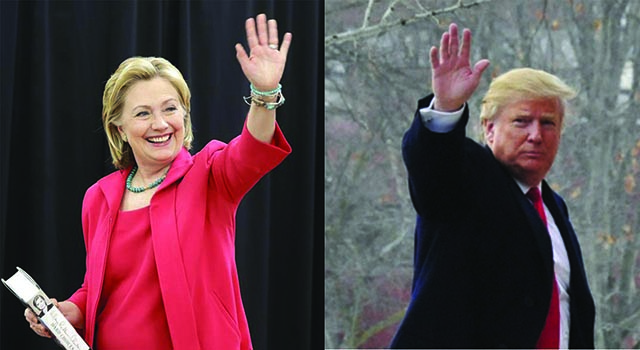It is no secret that this political sea- son has been quite the conundrum. We have two of the most controversial can- didates running for president in recent memory, and both are controversial for entirely different reasons.
At the Democratic National Con- vention (DNC), Bernie Sanders offi- cially nominated Hillary Clinton as the Democratic nominee for president. She won the nomination and will be running against Donald Trump in the general election.
Sanders’ nomination of Clinton came hot on the heels of the DNC email scandal, which implicated for- mer chairwoman Debbie Wasserman Schultz as colluding with the Clinton campaign and showing a blatant bias against Sen. Sanders.
A bigger issue that was finally settled was the question of whether or not Clinton would be criminally charged regarding the infamous email scandal.
If you are not up to speed, news broke that Hillary Clinton was sending and receiving classified and unclassi- fied emails from a private email server that she set up in her home. After this information was discovered, she wiped the server clean, destroying thousands of emails and documents of public record.
According to Cornell University Law School, Title 18 U.S. Code § 2071 states, “Whoever willfully and unlaw- fully conceals, removes, mutilates, obliterates, or destroys or attempts to do so, or, with intent to do so takes and carries away any record, proceeding, map, book, paper, document or other thing, filed or deposited with any clerk or officer of any court of the United States, or in any public office or with any judicial or public officer of the United States, shall be fined under this title or imprisoned not more than three years, or both.”
Whether or not Clinton’s actions are in violation of this law or any other re- garding the destruction of government documents is up for interpretation.
FBI director James Comey said that he FBI would not be recommend- ing charges against Clinton. Comey’s decision was finalized when Attorney General Loretta Lynch did not seek an indictment against Clinton.
Lynch’s refusal to charge Clinton came at an odd time, as former President Bill Clinton wandered onto Lynch’s plane at a Phoenix airport.
Both said the conversation was completely benign and that it happened to be bad timing. Poor form.
Trump has been in the limelight as well. First, for more distasteful remarks including Second Amend- ment activists and then for calling on Russian hackers to leak more Clinton emails.
The Second Amendment comment was at a rally in Wilmington, North Carolina where, according to CNN, Trump said, “’Hillary wants to abolish – essentially abolish – the Second Amendment. I tell you what, that will be a horrible day if Hillary gets to put her judges in. Right now we’re tied.’”
Whether this was said in jest or as a serious threat is irrelevant. It is danger- ous and reckless to say those sorts of things as a public figure – especially as a public figure running for president, mind you – to say these things.
According to CNN, the U.S. Secret Service has spoken with Trump in regards to the comment. These types of conversations should not need to take place with someone on the cusp of becoming the most powerful figure in the country, but apparently they do.
While both wings of the political system have had their issues and seem to still flounder, one who feels disenfranchised by both sides may look to the independent scene to see what it has to offer.
Gov. Gary Johnson and Gov. Bill Weld have polled over ten percent, which could offer them a place on the debate stage in September. The Commission on Presidential Debates has finally set their requirements to be invited to the debate stage, and some find the hurdle a bit much to overcome.
The CPD said that it would require the candidates to poll at or above 15 percent to be invited. Currently, as it stands, according to Real Clear Politics, the standings are 41 percent Hillary, 37 percent Trump, 10 percent Johnson and 4 percent Green Party candidate Jill Stein.
On its website, the CPD explained its reasoning for these requirements.
“The nonpartisan, voter education goal of the CPD’s debates is to afford the members of the public an opportunity to sharpen their views, in a focused debate format, of the leading candidates for President and Vice President of the United States,” the CPD wrote.
While there has been a lot that has happened on both sides of the aisle, the goal is still November. That is when all of this will finally end – but do not be bullied into voting for one side or another. As the Secretary of State said, “Vote your conscience.”

























